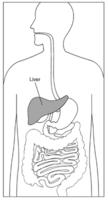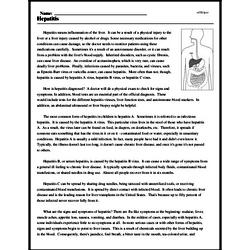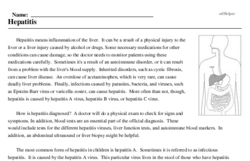Hepatitis
Hepatitis means inflammation of the liver. It can be a result of a physical injury to the liver or a liver injury caused by alcohol or drugs. Some necessary medications for other conditions can cause damage, so the doctor needs to monitor patients using these medications carefully. Sometimes it's a result of an autoimmune disorder, or it can result from a problem with the liver's blood supply. Inherited disorders, such as cystic fibrosis, can cause liver disease. An overdose of acetaminophen, which is very rare, can cause deadly liver problems. Finally, infections caused by parasites, bacteria, and viruses, such as Epstein-Barr virus or varicella-zoster, can cause hepatitis. More often than not, though, hepatitis is caused by hepatitis A virus, hepatitis B virus, or hepatitis C virus.
How is hepatitis diagnosed? A doctor will do a physical exam to check for signs and symptoms. In addition, blood tests are an essential part of the official diagnosis. These would include tests for the different hepatitis viruses, liver function tests, and autoimmune blood markers. In addition, an abdominal ultrasound or liver biopsy might be helpful.
The most common form of hepatitis in children is hepatitis A. Sometimes it is referred to as infectious hepatitis. It is caused by the hepatitis A virus. This particular virus lives in the stool of those who have hepatitis A. As a result, the virus later can be found on food, in diapers, on doorknobs, etc. Therefore, it spreads if someone eats something that has the virus in it or on it - contaminated food or water, especially in unsanitary conditions. Hepatitis A is usually a mild infection. In fact, many people have had it and didn't even know it. Typically, the illness doesn't last too long, it doesn't cause chronic liver disease, and once it's gone it's not passed to others.




